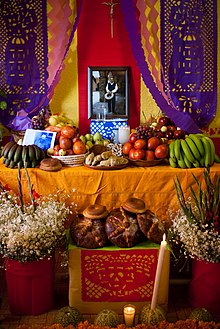Portal:Religion
The Religion Portal
Religion is a range of social-cultural systems, including designated behaviors and practices, morals, beliefs, worldviews, texts, sanctified places, prophecies, ethics, or organizations, that generally relate humanity to supernatural, transcendental, and spiritual elements—although there is no scholarly consensus over what precisely constitutes a religion. Different religions may or may not contain various elements ranging from the divine, sacredness, faith, and a supernatural being or beings. (Full article...)
 Vital article
Vital article
Myth is a genre of folklore consisting primarily of narratives that play a fundamental role in a society. For scholars, this is very different from the vernacular usage of the term "myth" that refers to a belief that is not true. Instead, the veracity of a myth is not a defining criterion. (Full article...)
 Did you know (auto-generated)
Did you know (auto-generated)
- ... that in her 2021 book White Evangelical Racism, professor of religion Anthea Butler called American evangelicalism a pro-Trump, "nationalistic political movement"?
- ... that Catherine de Parthenay, a 16th-century Huguenot leader, was a member of "a highly successful network of information" during the French Wars of Religion?
- ... that the Grave with the Hands commemorates a married couple, divided by society and religion, with hands clasped over a cemetery wall after death?
- ... that religious studies scholar C. Jouco Bleeker believed that religions are like acorns?
- ... that Freedom of Religion South Africa filed an unsuccessful lawsuit to keep child spanking legal?
- ... that fictional religions, often described in speculative fiction, have in some cases inspired real religious movements?
The Xá Lợi Pagoda raids (Vietnamese pronunciation: [saː˦˥ ləːj˨˩˨] SAW-LIE) were a series of synchronized attacks on various Buddhist pagodas in the major cities of South Vietnam shortly after midnight on 21 August 1963. The raids were executed by the Army of the Republic of Vietnam Special Forces under Colonel Lê Quang Tung, and combat police, both of which took their orders directly from Ngô Đình Nhu, younger brother of the Roman Catholic President Ngô Đình Diệm. Xá Lợi Pagoda, the largest pagoda in the South Vietnamese capital, Saigon, was the most prominent of the raided temples. Over 1,400 Buddhists were arrested, and estimates of the death toll and missing ranged up to the hundreds. In response to the Huế Vesak shootings and a ban on the Buddhist flag in early May, South Vietnam's Buddhist majority rose in widespread civil disobedience and protest against the religious bias and discrimination of the Catholic-dominated Diệm government. Buddhist temples in major cities, most prominently the Xá Lợi pagoda, became focal points for protesters and assembly points for Buddhist monks from rural areas. (Full article...)



































































